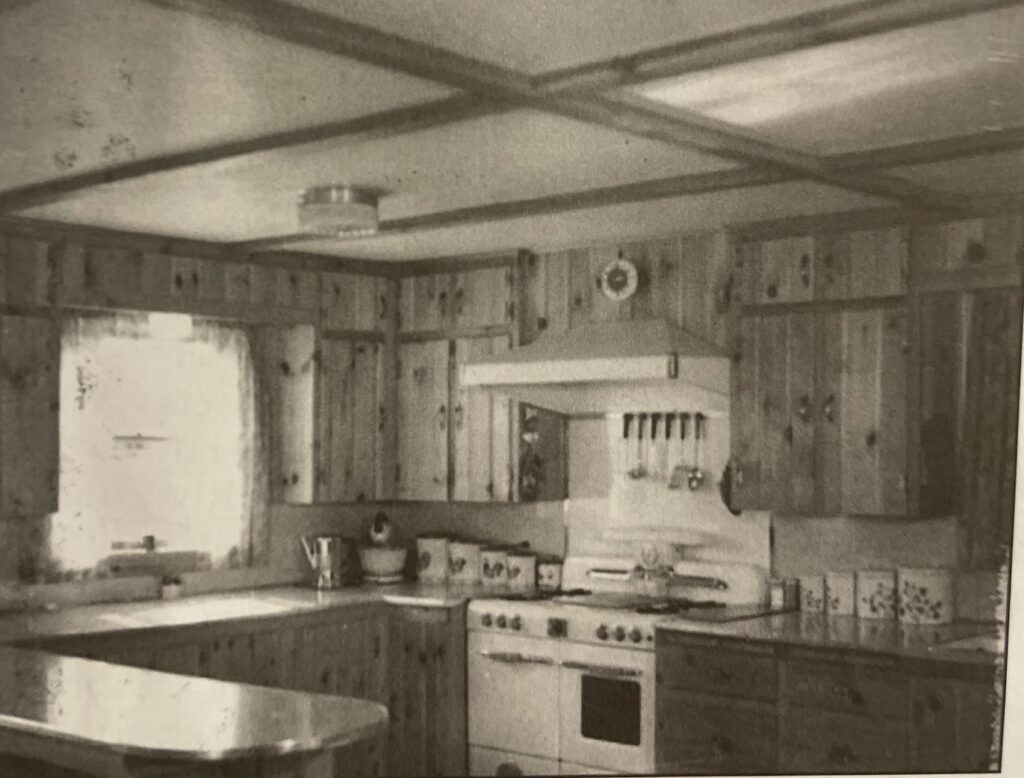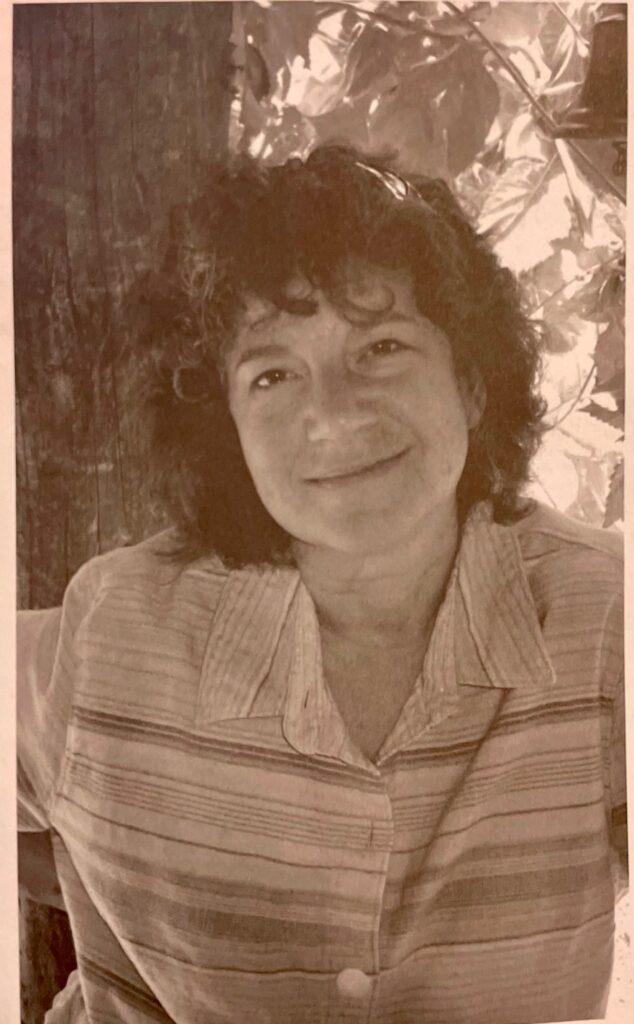WOODY CREEKER: Welcome, and thank you. I’m honored to have Ann Owsley in the Woody Creeker. So, you grew up on Owl Farm. What was it like back then?
ANN OWSLEY: It was a ranch, a working ranch, with cows and open pastures. We had lots of pets, and a potato cellar and a milk house. The cabin used to be this amazing milk house, really clean and open, and the cows would walk in one by one to be milked — like on command, they’d just walk in and line up. Our ranch covered about 500 acres, and the house that’s Owl Farm was our home.
WCR: I heard that the kitchen was a restaurant.

AO: Yes. My family originally moved to Aspen from the East coast in the early ’50s, and my parents ran a lodge. But my mother had grown up in New York, and as a kid she’d always wanted to live on a ranch and have her own horse. So then they bought the ranch in Woody Creek from Al and Alma Barbier and we each got our own horse, because it was her dream. Anyway, she thought that people in Aspen would like to take a trip to the country, so she opened a lunch restaurant, hired a cook, and set up one of those raised, Sears Roebuck swimming pools.
WCR: Is the house very different now than when you lived there?
AO: It’s incredibly not very different. It shocks me every time I walk in.
WCR: In what way?
AO: We had our Christmas tree next to the very same fireplace where you always have yours. The windows the paneling, the floors, the hall to m; old bedroom, even some of the original kitchen cabinets are there, and the layout of the kitchen is unchanged. Each of us kids put our initials into the wet cement in the basement, and they’re still there!
PEOPLE COME OUT HERE BECAUSE THEY’RE CHOOSING TO BE IN THE COUNTRY, AND THEN THEY TRY TO GET RID OF THE WILDLIFE. THEY KILL BADGERS, THEY KILL THE COYOTES, THEY WANT THE MOUNTAIN LION REMOVED.
WCR: And the changes?
AO: Of course the biggest changes are with Woody Creek itself. When you look out the windows now at Owl Farm, you see houses on the old pastures and there are houses in the pastures of the other ranches, too. But Woody Creek formed the first caucus — the first neighborhood caucus that was part of the Home Rule Charter of the country — so we began really very early in the development push to try to preserve Woody Creek.

WCR: Hunter was a big supporter of the caucus.
AO: Huge. Huge. Hunter helped make the caucus effective. He was instrumental in making the caucus effective because he was a loud, squeaky wheel. And he was always of interest to the press, so we got covered a lot, and we got a serious reputation in Aspen for being unreasonable and unwilling to shoulder our share of Aspen’s development. So we got a reputation in Aspen for being a quirky, crazy bunch of NIMBY people — real NIMBY. It’s really where that term started around here, to mean Woody Creek.
WCR: NIMBY is the acronym for Not In My Backyard.
AO: Right. So the Woody Creek Caucus has been fighting all these impacts from Aspen and we’ve been effective in doing it, but the result is that we’ve preserved all this beautiful land and the value of it has gone through the roof because it was preserved. So even people who would normally be anti-restriction, anti-zoning, anti-land-use, codes are benefiting from what we did. So they’ve got these pristine lands and beautiful open spaces, but only because of our efforts, which is pretty ironic.
WCR: Why ironic?
AO·: Some of them move here because they love the rural feel, and as soon as they get here they immediately try to change it. They immediately effect changes. They put in vast landscaping and they’re dumpmg fertilizer and herbicides on their creekside lawns and it flows into the Woody Creek — some have built ponds along the river. The first pond on the creek Hunter fought, tooth and nail.
SO WE GOT A REPUTATION IN ASPEN FOR BEING A QUIRKY, CRAZY BUNCH OF NIMBY PEOPLE — REAL NIMBY.
WCR: That was a famous feud. There was a car chase, right?
AO: Oh, yeah. That was, you know, a more activist time. And that was classic Hunter! What happened was that this neighbor built a pond, introduced exotic trout to it, and then he had to medicate the exotic trout. So, one day, the fish were floating upside down, dead, and this guy thought Hunter had poisoned them. Turned out that they’d done it themselves, by over-medicating. But all those medications got back into the creek. The other thing that happens with these new ponds is that the creek diverts into the pond, the water warms up, comes back into the creek, and changes the whole nature and ecology of the Woody Creek. So trying to preserve the Woody Creek has to become a real priority. We need to educate people about preserving what they’ve bought.
Another interesting sidelight is that people come out here because they’re choosing to be in the country, and then they try to get rid of the wildlife. They kill the badgers. They kill the coyotes. They want the mountain lions removed. It’s odd, because I know some of them support wildlife in other places — you know, people who worry about the mountain lions in southeastern Colorado, people who give to the World Wildlife Fund or the Sierra Club, people who give to the local shelter — and yet when they move into this neighborhood, they abandon all that in favor of hunting. Sport hunting.
WE ARE A HUGE VOICE. AND IF PEOPLE WANT TO HAVE A VOICE, THEY NEED TO JOIN THE CAUCUS.
WCR: Sport hunting.
AO: Blood sport. So that’s a puzzle. And suddenly it’s not so peaceful here, because all of that landscaping and all the gardeners and all the pool guys and all the maids and all the carpenters; they have impacts on Woody Creek, and our impacts ore overrunning our environment. Take the cars on the roads: you can’t even count them, and they’re all speeding. The caucus was informed that we have something live seventy gravel trucks per hour on the Smith Hill Bridge because of construction up in Aspen and in Snowmass Village and everywhere in the upper valley, and Woody Creek takes it in the neck.
All that construction takes and tons of excavation and gravel, and the gravel comes from us.
WCR: Literally . . .and I think in the caucus we’re still allowed to complain about the source, complain that the gravel pit can be in the middle of a neighborhood.
The truth is — let’s be cold-blooded about this — you can’t stop the gravel pit. We can’t stop it. The life of the pit is what determines the pit. We still want them to be good neighbors. But all this new development has taken everybody by surprise. They’re in-filling it faster than was ever anticipated, and all these projects are going to be taking more gravel than anyone could have guessed. So in a way, all the development is doing us a favor, because it’s shortening the life of the pit.
WCR: There we go. I guess my point was that we don’t have to be happy with the gravel pit, but we’re co-existing.
AO: Yes. They’ve always been very responsive, so it’s been a really careful relationship with the caucus and the gravel pit. If the noise is too loud, they address it, and the Environmental Health Department is out there monitor-ing it, or when it gets dusty, they water it down. The worst thing is to live next to a mine, and they’ve been good about being responsive to us.
WCR: Well, I appreciate that they’re responsive to putting the mining of the expansion on the highway side instead of on our side.
AO: Yes.
WCR: It hasn’t been approved, though.
AO: But they were sent back to the drawing board, and they can’t come forward to the county again until September, and when they do, that will be addressed.
WCR: And that worked because of the caucus.
AO: Because you were able, as a neighbor, to come to the caucus and say, “This is a problem and this is what I’m worried about,” and the caucus supported you and brought it forward as a group. When an individual tries to look like the crowd, he won’t have much impact, although he’ll be listened to. But when the caucus show up, we are a huge voice. And if people want to have a voice, they need to join the caucus.
WCR: That’s a good point. And what’s happening with the Woody Creek Store?
AO: We’re going to rebuild. We have to bring it up to building code to make it work, and to make it better. The store will look the same, but we’ve got to beef up the structure itself, which is a lot of work. The response by the community has been just amazing, because we all need it, you know, to be the place where we get to see each other and check in on what’s happening with everybody. And we’ll be a non-profit community center. Maybe we’ll have our own film festivals. And George [Stranahan] wants poker tournaments. Just a place where we can all be together.
WCR: Beautiful.
AO: Thank you.
